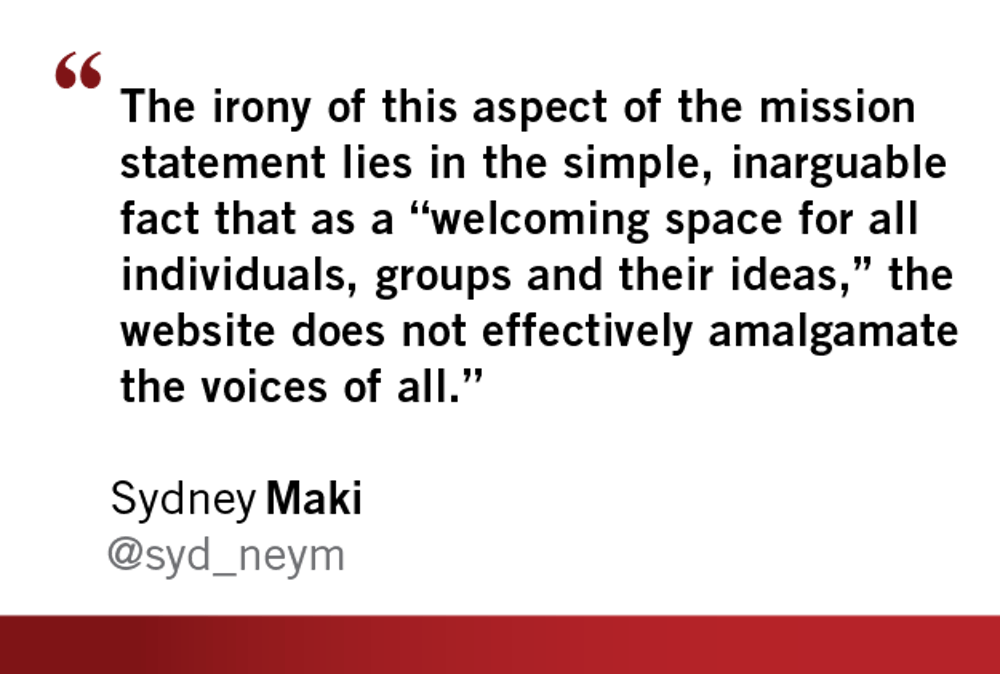The Huffington Post has become an online news empire. Like most online publishers, The Huffington Post separates its stories under different headings to maintain an organized, user-friendly webpage. However, unlike traditional newspapers, HuffPost titles some of its categories specifically for the demographics it hopes to appeal to, such as “Black Voices,” “Gay Voices,” “Latino Voices” and “Women.”
Of course the voices of African Americans, Latinos, women, and LGBT individuals should be equally incorporated into the world’s media, but having separate sections is not the way to go about it. The isolation of these perspectives thrives on the stereotypes, victimization and generalizations of marginalized groups.
The specificity of these headings is laughable. From a source as relevant as HuffPost, the separation of these groups is shocking, yet has somehow been completely overlooked. How has a publication as prominent as Huffington Post gotten away with publicly severing groups from others without notice?
 As part of the “Community Code of Conduct” on the FAQ page, HuffPost claims to be a “Safe Space.” The website states, “Above all, we believe strongly that The Huffington Post Community should be a safe and welcoming space for all individuals, groups and their ideas. As such, any rudeness, insults, hate, hostility, or negativity may be removed, and you may lose your ability to comment.”
As part of the “Community Code of Conduct” on the FAQ page, HuffPost claims to be a “Safe Space.” The website states, “Above all, we believe strongly that The Huffington Post Community should be a safe and welcoming space for all individuals, groups and their ideas. As such, any rudeness, insults, hate, hostility, or negativity may be removed, and you may lose your ability to comment.”
The irony of this aspect of the mission statement lies in the simple, inarguable fact that as a “welcoming space for all individuals, groups and their ideas,” the website does not effectively amalgamate the voices of all. Separating different perspectives creates an unnecessary division and victimization of certain groups and all of the other media included on the site. Although there is merit to a clearly defined location for groups to share their stories and interests, broad generalizations take place beneath the too specific headlines. Assumptions, social stigmas and inordinately standardized beliefs are allowed to run rampant.
If a reader were to stumble upon Huffington Post’s “Gay Voices” link, they would find an entire page of the site dedicated to entertainment, news, quizzes, blog posts and articles somehow defined as “gay.” Confusion arises when the editors decide that an article entitled Um, 'Shake it Off' Syncs Up Perfectly With This (Pretty Gay) '80s Workout Video belongs in the same section as one about a claim of semen in Starbucks. These articles were considered substantial enough for The Huffington Post’s “Gay Voices.” However, there is obvious stereotyping evident through the type of material assumed to be enjoyed by the respective community.
Defining a term such as “gay” is impossible to do without still alienating some, especially with stigmas still unfortunately attached to the word in the minds of some. Communication organizations should be working to equalize the treatment of all groups.The selections made of what to include are evidently determined by the audience, yet the stigmas these groups are often trying to lose are defining them.
Another example of the subjection and stereotyping involved with the separation of victimized groups can be found under ‘Women.” The space provided for their voices and perspectives is overrun with the issues that affect women daily. However, the issues mentioned within this (and other HuffPost headings) deserve to be marketed to a larger audience than just those searching within a specific heading.
By isolating the voices of women, LGBT, Latinos and African Americans, The Huffington Post continues to create a barrier between these groups and the rest of the media available. Separating perspectives does little to overcome the stereotypes these groups deserve to escape.
Reach the columnist at smmaki@asu.edu or follow her on Twitter @syd_neym
Editor’s note: The opinions presented in this column are the author’s and do not imply any endorsement from The State Press or its editors.
Want to join the conversation? Send an email to opiniondesk.statepress@gmail.com. Keep letters under 300 words and be sure to include your university affiliation. Anonymity will not be granted.
Like The State Press on Facebook and follow @statepress on Twitter.




